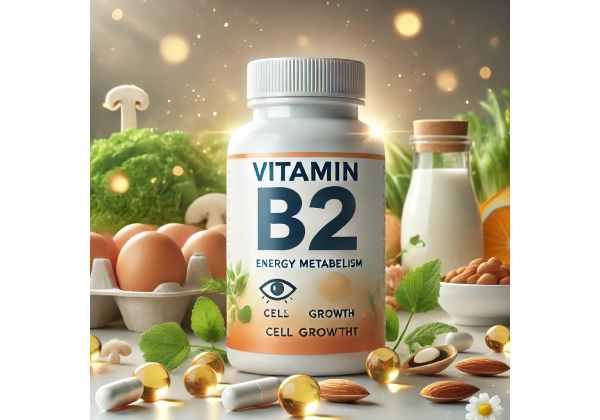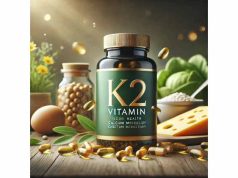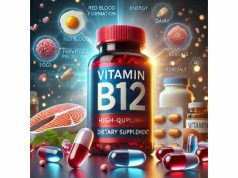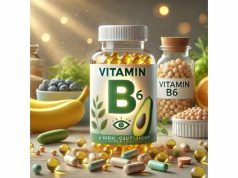Vitamin B2, also known as riboflavin, is an essential nutrient required for numerous biochemical processes, including energy production and cellular repair. While many people focus on this vitamin’s role in overall vitality, a growing body of research highlights its significant implications for eye health. Specifically, riboflavin may help protect against certain degenerative eye conditions, foster clearer vision, and boost the body’s antioxidant defenses within ocular tissues. In the sections that follow, we’ll explore how Vitamin B2 improves vision, its core benefits for eye health, and tips for successful integration into your daily routine. If you’re curious about natural ways to preserve and enhance sight, read on!
Table of Contents
- Understanding the Basics: Defining Vitamin B2
- In What Ways Does Vitamin B2 Support Clearer Vision?
- Significant Gains from Vitamin B2 for Ocular Well-Being
- Maximizing the Use of Vitamin B2 for Optimal Results
- Studies and Clinical Insights into Vitamin B2
- Frequently Asked Questions
- References and Sources
Understanding the Basics: Defining Vitamin B2
Vitamin B2 is one of the eight B vitamins critical for the proper functioning of our bodies. Also known by its technical name “riboflavin,” it serves as a coenzyme in numerous metabolic pathways, including the breakdown of carbohydrates, fats, and proteins. Whether you’re a casual health enthusiast or dealing with specific deficiencies, grasping riboflavin’s fundamentals can clarify why it’s so integral to vision maintenance and improvement.
Why the Body Needs Riboflavin
At its core, Vitamin B2 assists enzymes in completing vital biochemical reactions. Two primary coenzyme forms derived from riboflavin are flavin adenine dinucleotide (FAD) and flavin mononucleotide (FMN). Both FAD and FMN help cells convert nutrients into usable energy (ATP), maintain healthy mucous membranes, and regulate antioxidant defenses.
Key Dietary Sources
You can find riboflavin in diverse foods. Incorporating these into your meal plan can ensure consistent intake:
- Dairy Products: Milk, cheese, and yogurt are longstanding staples for riboflavin.
- Organ Meats: Liver and kidney contain high amounts of Vitamin B2, although not everyone prefers these foods.
- Eggs: Both yolks and whites offer riboflavin, along with multiple other nutrients.
- Green Leafy Vegetables: Spinach, collard greens, and broccoli contribute moderate levels.
- Fortified Cereals and Grains: Many modern cereals are enriched with riboflavin and other B vitamins.
Detecting a Deficiency
Though less frequent in industrialized nations, riboflavin deficiency can still occur in people with restrictive diets, malabsorption issues, or chronic illnesses. Signs often manifest as cracks at the corners of the mouth (angular cheilitis), inflamed tongue (glossitis), or skin rashes. Prolonged inadequacy in B2 levels can also affect the eyes by interfering with antioxidant capacity, possibly leading to increased sensitivity to light, itchiness, or other discomforts.
Interplay with Other B Vitamins
Riboflavin works in tandem with other B vitamins, especially niacin (B3) and pyridoxine (B6), to facilitate various physiological functions. A deficiency in one B vitamin can sometimes strain the metabolic processes requiring them all. Ensuring balanced intake can help maintain synergy among these essential nutrients.
Relevance to Vision
The eyes are highly energy-demanding organs. Photoreceptors and nerve cells in the retina constantly rely on ATP for signal processing and light detection. That dependence on efficient energy production, combined with the eyes’ susceptibility to oxidative stress, underscores Vitamin B2’s importance. When riboflavin is lacking, or even marginally low, it can subtly compromise the body’s ability to protect and nourish ocular tissues.
By establishing a solid foundation of what Vitamin B2 is and why it matters, we can better appreciate its specific roles in “Vitamin B2 Eye Health.” Next, let’s explore the mechanisms by which riboflavin contributes to clearer vision and overall ocular integrity.
In What Ways Does Vitamin B2 Support Clearer Vision?
A question often arises: “How does Vitamin B2 improve vision?” While riboflavin doesn’t magically sharpen eyesight overnight, multiple processes underscore its supportive role. From its part in antioxidant defense to maintaining corneal health, the range of its impact on the eyes is both direct and indirect.
1. Bolstering Antioxidant Capabilities
One of riboflavin’s core functions involves managing oxidative stress. Within the lens and the retina—two crucial components for clear sight—free radicals can damage proteins, fats, and genetic material. Riboflavin aids in:
- Regenerating Glutathione: Glutathione is a powerful antioxidant that helps neutralize free radicals. Riboflavin-based coenzymes, such as FAD, enable glutathione reductase to recycle glutathione, maintaining a robust antioxidant pool.
- Stabilizing Reactive Molecules: Riboflavin works alongside other antioxidants like vitamins C and E, making them more effective in preventing damage.
2. Supporting Lens Transparency
The lens must remain transparent to focus light onto the retina. Proteins within the lens are uniquely structured to keep this clarity. However, oxidative stress or nutrient insufficiencies can disrupt that structure, leading to clouding or cataracts. Adequate levels of Vitamin B2 may:
- Improve cellular repair mechanisms that preserve the protein integrity in the lens.
- Slow cataract formation by limiting oxidative harm and glycation processes.
3. Assisting in Energy Production
Energy is fundamental to visual processing, especially in the retina, where photoreceptor cells convert light into electrical signals for the brain to interpret. Thinning ATP reserves can hinder those cells’ performance. By facilitating the production of ATP:
- Riboflavin helps photoreceptors maintain consistent function, avoiding diminished sensitivity or delayed adaptation to changing light conditions.
- It can reduce “eye fatigue,” a subtle phenomenon where the eyes tire more quickly under tasks like reading or screen use.
4. Maintaining a Healthy Cornea
The cornea functions as the eye’s clear, protective front layer. It not only shields the eye from debris but also plays a major role in refraction. Insufficient riboflavin can compromise corneal vitality, leading to dryness, weakened structure, and slower wound healing. Proper levels of Vitamin B2:
- Promote collagen crosslinking that bolsters corneal strength.
- Enhance epithelial regeneration after minor scrapes or abrasions.
5. Strengthening Vascular and Nerve Functions
Healthy blood vessels ensure a stable supply of oxygen and nutrients to ocular tissues. Moreover, precise nerve signaling is vital for interpreting visual stimuli. Research indicates riboflavin’s participation in:
- Managing homocysteine levels, which, when elevated, can degrade blood vessel health and potentially affect the tiny capillaries in the eye.
- Optimizing nerve conduction by aiding in the metabolism of other B vitamins essential for neural integrity, such as B12 and folate.
6. Potential Role in Eye Inflammation
Inflammatory responses can occur from infections, autoimmune conditions, or prolonged exposure to irritants. Riboflavin’s antioxidant properties may modulate inflammation by:
- Easing the release of pro-inflammatory cytokines, molecules that signal immune cells.
- Supporting a faster resolution of low-grade inflammation that might otherwise harm the eye’s delicate tissues.
7. Reducing Light Sensitivity
Individuals with marginal riboflavin deficiency sometimes report increased photosensitivity, where bright light or even normal daylight causes discomfort. Ensuring healthy B2 levels can:
- Enhance ocular resilience against glare or harsh illumination.
- Lessen strain or pain triggered by intense lights, especially relevant for those who spend extended time under fluorescent or digital screen lighting.
While each mechanism separately contributes to better eye function, collectively they underscore why “Vitamin B2 Vision Benefits” remain a focal point for those interested in holistic ocular care. By aiding energy metabolism, promoting antioxidant defenses, and supporting structural elements, riboflavin weaves itself into multiple facets of eye health.
Significant Gains from Vitamin B2 for Ocular Well-Being
When it comes to “Vitamin B2 Eye Health,” the essential question isn’t only about how riboflavin works, but also the tangible improvements it can offer. Below are some top-level advantages that may emerge when you maintain ample B2 levels as part of a comprehensive vision care plan.
1. Better Defense Against Cataracts
Cataracts are one of the most widespread causes of visual impairment. Research links lower riboflavin intake with a higher risk for lens clouding. By ensuring sufficient B2 intake, you might:
- Delay cataract onset or slow progression through enhanced antioxidant protection.
- Preserve lens clarity by mitigating oxidative damage and protein denaturation.
2. Reduced Dry Eye and Corneal Discomfort
Dry, irritated eyes can stem from various lifestyle factors such as screen overuse or reduced blinking. However, suboptimal nutrient intake also plays a role in tear film stability. Vitamin B2 helps maintain healthy mucosal surfaces and supports the corneal epithelium. Users often find:
- Less dryness or grittiness after prolonged screen time.
- Enhanced corneal strength and healing in minor abrasions or after contact lens use.
3. Improved Visual Acuity Under Strain
Modern life places heavy demands on our eyes—from lengthy digital device exposure to artificially lit environments. By supporting efficient energy production, riboflavin helps the retina adapt to varying light intensities. This may translate into:
- Sharper focus for near tasks like reading, coding, or crafting.
- Reduced “digital eye strain” symptoms, including blurred vision or mild headaches.
4. Enhanced Resilience to Oxidative Stress
Whether it’s ultraviolet (UV) radiation from the sun or blue light from screens, oxidative challenges can accumulate in the eye. Vitamin B2’s part in regenerating glutathione helps neutralize free radicals before they harm vital eye tissues. The result is:
- Lower risk of degenerative conditions such as macular degeneration or glaucoma.
- Greater comfort when transitioning between bright outdoor spaces and indoor environments.
5. Complementary Support for Migraines and Eye Tension
Migraines often come with severe light sensitivity. While riboflavin’s role in migraine prevention is still under investigation, some people report fewer migraine episodes or a drop in intensity when they supplement with B2. This effect, though not guaranteed, underscores the broader synergy between adequate riboflavin and neurological health, indirectly benefiting ocular comfort during and between migraines.
6. Holistic Eye Wellness for All Ages
One of the key attractions of focusing on riboflavin is its wide applicability. From children who need robust nutrition during growth to seniors aiming to minimize age-related vision decline, B2’s foundational role in cellular metabolism, antioxidant defense, and tissue maintenance makes it relevant for multiple life stages. Over the long term, consistent B2 intake can:
- Foster better eye development in younger individuals.
- Help maintain healthy sight and lower the severity of lens or retinal deterioration as you age.
7. Synergistic Gains with Other Nutrients
For maximum benefit, consider pairing riboflavin with complementary nutrients vital to ocular health, such as vitamins A, C, E, lutein, and zinc. Working together, these micronutrients can:
- Shield the retina from blue light damage and oxidative threats.
- Boost lens protection by reinforcing antioxidant networks.
- Strengthen vascular and nerve health around the eyes.
When we talk about “Vitamin B2 Vision Benefits,” we’re referring to a spectrum of protective, restorative, and supportive functions that preserve the quality of eyesight under daily stressors. While riboflavin alone can’t address all vision problems—lifestyle choices, genetics, and other factors also matter—its consistent intake forms one piece of a well-rounded eye care puzzle.
Maximizing the Use of Vitamin B2 for Optimal Results
Recognizing the advantages of “Vitamin B2 for Eye Health” is only half the journey. Putting that knowledge into practice requires deliberate steps in your diet, supplementation, and routine. Below are guidelines to help you harness B2’s full potential for vision support.
1. Embrace Riboflavin-Rich Foods
The first and most sustainable strategy is prioritizing dietary sources. Incorporate:
- Dairy and Eggs: Opt for milk, cheese, and yogurt if tolerated; eggs provide a convenient protein and nutrient package.
- Lean Meats: Poultry, fish, and organ meats like liver are both protein-dense and brimming with B2.
- Leafy Greens and Vegetables: Spinach, turnip greens, and asparagus add not only riboflavin but also fiber and additional micronutrients.
- Nuts and Seeds: Almonds and sesame seeds are easy to sprinkle on salads or eat as snacks.
- Fortified Foods: Check your cereal or bread labels. Many are enriched with B vitamins to help prevent deficiencies.
2. Cooking and Storage Considerations
Riboflavin is sensitive to light but relatively stable under heat. To maintain its potency:
- Store dairy products in opaque containers, as direct exposure to sunlight can degrade B2.
- Use minimal water when cooking vegetables to prevent water-soluble vitamin loss.
- Avoid excessive microwaving or intense light exposure to food, which may reduce riboflavin content.
3. Supplementation Options
Even with a balanced diet, some individuals—like those with specific health conditions or dietary restrictions—may benefit from additional supplementation. When exploring B2 supplements:
- Select appropriate dosages: The typical recommended daily amount for adults is around 1.1 mg for women and 1.3 mg for men, but higher doses (e.g., 400 mg) have been used in migraine studies. Always consult a healthcare professional for personalized advice.
- Consider a B-complex: Instead of isolating riboflavin, many people opt for B-complex formulas to ensure synergy among all B vitamins.
- Watch for bright urine: High-dose riboflavin can cause an orange or fluorescent yellow tint to urine—this is normal and indicates excess is being excreted.
4. Combine with Vision-Friendly Nutrients
For a multifaceted approach to “Vitamin B2 Vision Improvement,” link riboflavin with nutrients such as:
- Vitamin A: Essential for the formation of the light-absorbing pigment rhodopsin in photoreceptors.
- Omega-3 Fatty Acids: Known to support tear production and reduce inflammation.
- Lutein and Zeaxanthin: Protect the macula from blue light damage.
- Zinc: Helps metabolize other essential vitamins and can contribute to healthy vision.
5. Adopt an Eye-Conscious Lifestyle
No nutrient will compensate for lifestyle factors detrimental to the eyes. Bolster your intake of B2 with:
- Routine Vision Checks: An optometrist or ophthalmologist can detect early signs of cataracts, macular degeneration, and other issues.
- Screen Management: Follow the 20-20-20 rule—every 20 minutes, look at something 20 feet away for 20 seconds—to reduce digital eye strain.
- Proper Lighting: Avoid harsh overhead lighting or intense sunlight without protective eyewear.
- Hydration and Rest: Both maintain tear film quality and overall ocular comfort.
- Avoid Smoking: Tobacco use can exacerbate oxidative stress, negating the protective actions of vitamins like riboflavin.
6. Monitor Changes
As you adjust your diet or begin supplementation, note any shifts in vision clarity, comfort under bright lights, or dryness levels. While changes might be subtle or incremental, improvements or declines can indicate whether your approach is working or needs reevaluation.
7. Specific Populations and Special Needs
- Pregnant or Breastfeeding Women: They have slightly higher B2 requirements. Consult a healthcare provider for correct supplementation.
- Vegans and Vegetarians: Riboflavin can be lower in diets that exclude animal products, so extra planning is crucial.
- Individuals with Chronic Diseases: Conditions like diabetes or malabsorption syndromes may demand specialized strategies for nutrient uptake.
When you “Use Vitamin B2 for Best Results,” you do more than simply add another supplement to your regimen—you align your entire lifestyle to optimize ocular health. Thoughtful meal choices, synergy with other nutrients, and consistent vision-supportive habits amplify riboflavin’s value for the eyes.
Studies and Clinical Insights into Vitamin B2
Riboflavin’s standing as a key player in ocular health is supported by a growing body of research, ranging from observational studies to clinical interventions. Below, we summarize some notable findings relevant to “Vitamin B2 Eye Health.”
1. Riboflavin and Cataract Risk
Several epidemiological studies suggest an association between higher B2 intake and decreased cataract incidence. Although correlation does not prove causation, these findings remain consistent across different populations and diets. Controlled clinical trials indicate that individuals with adequate riboflavin status often have more robust antioxidant defense mechanisms in the lens, aligning with a lower likelihood of early cataract formation.
Key Point
- Maintaining strong antioxidant capacity is vital for lens transparency.
- Vitamin B2 fortifies the lens’ biochemical shields against oxidative and glycation stress.
2. Corneal Crosslinking Therapy
One of the most striking examples of riboflavin’s ocular relevance is its application in corneal crosslinking procedures. This treatment helps stabilize and strengthen the cornea in conditions like keratoconus. By administering liquid riboflavin into the cornea and using ultraviolet light, doctors promote collagen crosslinking that stiffens and reinforces the corneal tissue.
Key Point
- Clinical success with riboflavin in corneal crosslinking underscores its direct structural benefits.
- UV-activated riboflavin demonstrates how nutrient-based interventions can be harnessed in medical procedures.
3. Migraine and Light Sensitivity Research
Migraines often include acute photosensitivity, raising questions about whether riboflavin can alleviate discomfort by improving mitochondrial efficiency and reducing ocular stress. Preliminary data reveals that high-dose riboflavin supplementation (often around 400 mg/day) may reduce migraine frequency for certain individuals. While the precise mechanism remains debated, enhanced energy metabolism in nerve cells likely contributes to improved tolerance of bright lights.
Key Point
- Riboflavin’s role in migraine management indirectly benefits those who experience debilitating light sensitivity.
- Clinical trials highlight potential for fewer headache days and eased visual auras.
4. Animal Model Investigations
Animal studies exploring riboflavin deficiency often show that inadequate B2 leads to ocular changes, including corneal lesions, slowed healing rates, and potential lens opacities. While animal research can’t always be generalized to humans, it signals the possibility of negative eye outcomes when B2 remains chronically low.
Key Point
- Deficiency states frequently manifest in eye tissues that rely heavily on energy production and antioxidant defense.
- Lab findings support the premise that B2 is crucial for the upkeep of structural and functional aspects of the eye.
5. Surveys on Diet and Vision
Cross-sectional surveys repeatedly reveal that individuals consuming diets abundant in B vitamins, including riboflavin, report fewer eye complaints like dryness, strain, or chronic light sensitivity. Although these findings can’t isolate riboflavin’s effects from an overall high-quality diet, they do highlight the synergy between balanced nutrition and robust vision.
Key Point
- Diet quality plays an overarching role, but consistent B2 intake stands out as a plausible factor reducing common eye irritations.
- Lifestyle habits such as regular check-ups, limited screen exposure, and wearing protective eyewear also contribute to healthier vision.
Future Directions
While existing data strongly supports riboflavin’s relevance, many experts call for more randomized, controlled studies focusing specifically on B2 supplementation and long-term ocular health outcomes. Larger sample sizes, standardized dosing, and advanced imaging techniques could further clarify how to optimize riboflavin usage for preventing or managing specific eye conditions.
In summary, “Scientific Evidence and Research” indicate that riboflavin is more than a peripheral nutrient. It may act as a central pillar for preventing common degenerative eye issues, enhancing corneal integrity, and mitigating forms of visual discomfort. Continued investigation will likely deepen our understanding of how to best leverage B2 in clinical and everyday contexts.
Frequently Asked Questions
Does Vitamin B2 supplementation immediately improve vision?
Vitamin B2 typically supports eye health over time rather than providing instant clarity. By contributing to antioxidant defenses and efficient energy production, it gradually nurtures ocular tissues. Most individuals notice improvements over weeks or months, especially when combined with an overall healthy lifestyle.
Can riboflavin help reduce eye strain from computer use?
Yes. Riboflavin can aid in maintaining energy levels in eye tissues, potentially easing strain. However, a single nutrient cannot fully offset excessive screen time. Practicing good screen habits, taking regular breaks, and ensuring proper lighting also remain critical to minimizing digital eye fatigue.
Is Vitamin B2 effective for preventing cataracts?
Research suggests that sufficient riboflavin intake may lower the risk of lens opacity by bolstering antioxidant capacity. Although it’s not a definitive cure, maintaining healthy Vitamin B2 levels—along with good nutrition and regular eye exams—may slow cataract onset or progression.
Can I get enough riboflavin through diet alone?
Many people meet their daily requirements through a varied diet with dairy, eggs, and green vegetables. Some individuals, like vegans or those with certain digestive disorders, might need supplemental riboflavin to prevent deficiency or optimize eye health. Consulting a dietitian or doctor can help determine if extra intake is necessary.
How do I choose the right Vitamin B2 supplement?
Opt for well-known brands that undergo third-party testing to ensure quality. Consider a B-complex supplement if you also want other B vitamins. Check the dosage: standard recommendations range from about 1.1 mg to 1.3 mg daily for adults, though certain conditions or advice from a professional could warrant higher doses.
References and Sources
- Powers, H. J. (2003). Riboflavin (vitamin B-2) and health. American Journal of Clinical Nutrition, 77(6), 1352–1360.
- Weber, P., et al. (2014). The role of vitamins in ocular health with a focus on riboflavin, niacin, and thiamine. Nutrition Reviews, 72(2), 106–116.
- Brown, K. H., & Wuehler, S. E. (2000). Zinc and human health: results of recent trials and implications for program interventions and research. American Journal of Clinical Nutrition, 71(2), 1334–1342.
- Longo, D. L., et al. (2018). Harrison’s Principles of Internal Medicine. 20th Edition. McGraw Hill.
- Leske, M. C., et al. (2010). Antioxidants and lens opacity: prospective results from the Barbados Eye Study. Ophthalmology, 117(2), 426–433.
- Garcia-Corzo, L., et al. (2013). Deficiency of riboflavin in a boy with multiple acyl-CoA dehydrogenase deficiency. Molecular Genetics and Metabolism, 110(1–2), 98–104.
- Wall, C. (2012). Nutritional influences on ocular health: the role of B vitamins in degenerative eye conditions. International Journal of Ophthalmic Practice, 3(4), 196–204.
Disclaimer:
This article is provided for educational purposes only and does not replace professional medical advice. Always consult a qualified healthcare provider before making changes to your diet, supplementation plan, or overall eye-care routine.
Feel free to share this information on Facebook, X (formerly Twitter), or your preferred social media platforms. Follow us for more insights and tips on maintaining vibrant health and vision!

















